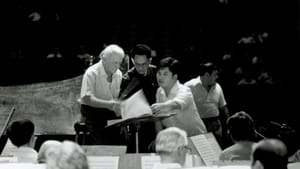Stay in the Loop
BSR publishes on a weekly schedule, with an email newsletter every Wednesday and Thursday morning. There’s no paywall, and subscribing is always free.
Philadelphians in China
PBS presents ‘Great Performances: Beethoven in Beijing’

Beethoven in Beijing, an award-winning American documentary film getting its PBS premiere this week, reminds us that one of the forces that helped shape China’s musical destiny after the Cultural Revolution was none other than our hometown band, the Philadelphia Orchestra. The ensemble has visited China 12 times, more than any other American orchestra, and each time it was the enduring connections between people that helped to break the hold of authoritarianism and censorship.
The world of the Chinese Cultural Revolution, stretching from the end of World War II until American and Chinese leaders began to meet and converse in the early 1970s, was a world without public music, art, dance, and theater. It was a world dominated by jingoistic propaganda, where self-expression was considered a crime against the state, and you could die because you played the piano or taught a music history course.
Improbable but true
Airing as part of the Great Performances series on April 16, the new documentary tells the improbable but true story of how one group of courageous Philadelphians not only brought Beethoven back to China, but also lit the spark that restored a love and enthusiasm for music to a land of one and a half billion people. And yes, there are plenty of excerpts of Beethoven symphonies in this film, including the 1st, 5th, 6th, and 9th.
In chilling clips and flashbacks, the film reveals how the war on culture developed in a country shut off from contact with the West. But in 1973, as a result of talks between US President Richard Nixon and Chairman Mao Zedong, the Philadelphia Orchestra under conductor Eugene Ormandy was invited to perform in the People’s Republic of China. The orchestra not only performed programs of popular Western classics, but also met with and interacted with Chinese musicians who had continued their studies in secret throughout the years of persecution.
In one of the most touching moments in the film, a Chinese musician recounts how violinist Booker Rowe (recently retired from the orchestra) gave her his own complete score of Mendelssohn string quartets, complete with his up-bow and down-bow penciled-in instructions. “At that time,” she said, “you could not find such a score in all of China.” A Chinese oboist similarly embraced the gift of several oboe reeds from then-principal oboist John de Lancie, in turn distributing them among his fellow reed-players.
Lively, absorbing, encouraging
Much has happened in the past 50 years, of course, and today, according to some reports, China boasts 40 million piano students as well as millions of other music students with no shortage of concert halls, opera houses, and music conservatories. Jie Chen, a young Chinese pianist who has been studying at the Curtis Institute in Philadelphia, noted that Shanghai alone has five or six large concert venues in regular use.

The film includes appearances and comments by Yannick Nézet-Séguin, conductor of today’s Philadelphia Orchestra; Tan Dun, the Academy Award-winning composer of Crouching Tiger, Hidden Dragon (and one of the producers of the film); Gary Graffman, Curtis professor and pianist, and one of his most celebrated students, pianist Lang Lang. Jennifer Lin and Sharon Mullally directed.
The film is lively and absorbing, incorporating vintage news clips and photos from the past with exciting footage from today’s fast-paced urban life. I find the narrative sometimes a little hard to follow as the focus shifts from the Cultural Revolution to the Philadelphia Orchestra’s first visit to China, to what is happening today in China relating to new Chinese music, traditional instruments, and Western composers. But if it is a jumble of ideas and impressions, it is an encouraging one: we see what a huge difference it makes when music is kept in public schools, rather than being unilaterally cut to make room for STEM courses, sports, and improving test scores.
Among the film’s producers and speakers is Jindong Cai, director of the US-China Music Institute at Bard College Conservatory of Music. Bard is to be applauded for its enthusiastic leadership in developing both Chinese and Western musical programs that nurture and speak to each other with impressive programs, many of them free, throughout this pandemic.
Great Performances: Beethoven in Beijing premieres Friday, April 16 at 9pm EST on PBS.
Image description: A black-and-white photo from 1973 shows three men, one American and two Chinese, turning over pages on a musical score together on a podium. Musicians facing their own scores wait in front of them.
Image description: A color photo from 2016 shows Yannick Nézet-Séguin, a white man wearing a navy-blue shirt, and Lang Lang, an Asian man wearing a black shirt, leaning over a musical score together, spread on a shiny black grand piano.
What, When, Where
Beethoven in Beijing, directed by Jennifer Lin and Sharon Mullally, will air on PBS on Friday, April 16 at 9pm.
Sign up for our newsletter
All of the week's new articles, all in one place. Sign up for the free weekly BSR newsletters, and don't miss a conversation.

 Linda Holt
Linda Holt